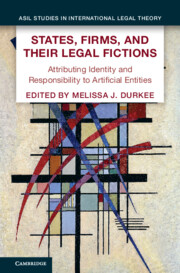 States, Firms, and Their Legal Fictions
States, Firms, and Their Legal Fictions Book contents
- States, Firms, and Their Legal Fictions
- ASIL Studies in International Legal Theory
- States, Firms, and Their Legal Fictions
- Copyright page
- Contents
- Contributors
- Acknowledgments
- 1 Introduction
- Part I International Attribution
- Part II Transnational Attribution
- 6 Corporate Structures and the Attribution Dilemma in Multinational Enterprises
- 7 Transnational Blame Attribution
- 8 Mind the Agency Gap in Corporate Social Responsibility
- Part III Domestic Attribution
- Part IV Conceptual Origins and Lineages
- Index
6 - Corporate Structures and the Attribution Dilemma in Multinational Enterprises
from Part II - Transnational Attribution
Published online by Cambridge University Press: 29 February 2024
- States, Firms, and Their Legal Fictions
- ASIL Studies in International Legal Theory
- States, Firms, and Their Legal Fictions
- Copyright page
- Contents
- Contributors
- Acknowledgments
- 1 Introduction
- Part I International Attribution
- Part II Transnational Attribution
- 6 Corporate Structures and the Attribution Dilemma in Multinational Enterprises
- 7 Transnational Blame Attribution
- 8 Mind the Agency Gap in Corporate Social Responsibility
- Part III Domestic Attribution
- Part IV Conceptual Origins and Lineages
- Index
Summary
This chapter explores how multiple corporate structures in multinational enterprises operating in developing countries, and in Africa in particular, make determinations of responsibility among the members of such corporate families difficult. Specifically, this chapter challenges the assumption that the end of colonial rule and the founding of African states threw off the economic subordination that characterized colonial-era corporate activity in Africa. The end of colonial rule was accompanied by a desire on the part of multinational corporations to re-legitimize their activities in service of the newly independent governments through Africanization, which involved hiring African directors and officers as well as establishing domestic subsidiaries with African directors and officers. These strategies, together with the indigenization policies of post-colonial governments, in part account for the emergence and proliferation of multiple corporate structures in post-colonial African countries. Those complex structures, in turn, facilitate opportunistic behavior by transnational elites and complicate attribution of responsibility in the context of taxes and other financial liabilities.
Keywords
- Type
- Chapter
- Information
- States, Firms, and Their Legal FictionsAttributing Identity and Responsibility to Artificial Entities, pp. 113 - 130Publisher: Cambridge University PressPrint publication year: 2024
